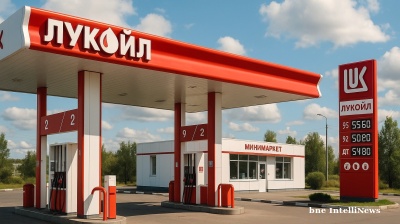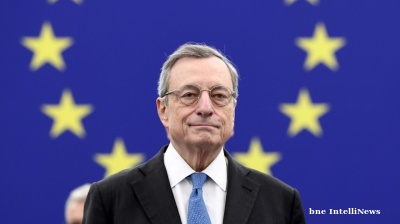As Tehran continues to face mounting pressure from the US and its European counterparts, the strategic value of other alliances is becoming more pressing following the so-called 12-day war with Tel Aviv and Washington.
With the threat of renewed United Nations sanctions looming, Tehran is increasingly looking to the Shanghai Cooperation Organisation (SCO) as a potential bulwark against Western isolation. As IntelliNews previously noted, the heft of the rag-tag political group has become more focused in recent years since the re-election of Donald Trump and his tariff debacle, which has given friends and foes cold feet.
The backdrop of this year's event in China for Iran's President Masoud Pezeshkian is likely welcome relief from the troubles at home. Troubled with a collapsing rial, battered by increasing inflation across the board and ultimately facing potshots from internal enemies, the Iranian president is clearly showing strain after the recent war with Israel in this week's meeting.
What appears to be troubling the Iranian president more is the impending collapse of the 2015 nuclear agreement with world powers, the Joint Comprehensive Plan of Action (JCPOA), once promised relief from sanctions in exchange for curbs on its nuclear programme. That agreement, which expires in less than 28 days, is set to hurtle Tehran back into the sanctions bullseye with European signatories (France, Germany, and the UK, collectively known as the E3). Pezeshkian, for all his speeches in his election campaign, has failed to mitigate the fallout, prompting Iran to scale back its commitments, ramping up uranium enrichment to 60% purity, restricting access for IAEA inspectors, and disabling monitoring equipment.
Now, the E3 has triggered the JCPOA’s dispute resolution mechanism, commonly referred to as the “snapback”, which could reinstate all UN sanctions. The Iranian government is scrambling to show it has friends in high places. However, making Vladimir Putin wait during the SCO on September 1 live on Iranian television appears to be a home goal.
Prior to the SCO summit, Tehran denounced the Europeans' move as legally and morally baseless. The Europeans also knew Pezeshkian would be meeting with his Russian and Asian counterparts only days later.
Russia and China, meanwhile, have opposed the alleged snapback and submitted a draft resolution to the UN Security Council seeking to extend the deal’s timeline and allow diplomacy to continue. Yet, given Washington’s sway at the Council, few expect the effort to succeed; at best, they may muddy the waters.
Yet in this climate, Iran’s engagement with multilateral organisations outside the Western sphere of influence becomes not just strategic, but essential; that is not in doubt. What many mandarins in Tehran worry about is that they are left to face the vanguard of Western sanctions alone.
In theory, the SCO, a bloc of non-Western nations that Iran formally joined in July 2023, offers a platform for diplomatic, economic, and legal support. While its capacity to shield Iran remains in question, Trump's erratic moves in recent months and America's reshoring efforts have left a vacuum Iran hopes Beijing and Moscow will fill. But there are doubts in Tehran the group will actually help.
At the summit, member states issued a strong condemnation of the June military strikes by Israel and the United States against Iran, calling for renewed dialogue to prevent further escalation, but that is all they have done so far, repeating previous mealy-mouthed efforts to call for calm against their ally.
Iranian President Masoud Pezeshkian used the summit to propose two key initiatives: a foreign ministers’ committee to address regional crises and a financial mechanism to counter the impact of unilateral sanctions.
The peace committee, he suggested, would convene swiftly at the request of any member facing a sovereignty threat, acting as both a strategic and operational arm of the organisation. On the economic front, Iran’s “Special Accounts and Settlements Initiative” would promote trade in national currencies, shared digital infrastructure, including central bank digital currencies, and a multilateral currency swap fund to support members under financial pressure. Tehran desperately needs the SCO to back this proposal because of the economic situation at home.
Currency swap arrangements, sovereign funds, and alternative payment systems could help Iran maintain trade and liquidity even if excluded from SWIFT or dollar-based transactions. Still, again, these seem far-flung and unlikely to happen in the next six months.
The SCO could offer legal and normative support in theory, by promoting alternative interpretations of international law and backing Iran in international forums. The organisation could broadly challenge the legitimacy of the snapback mechanism and unilateral sanctions. But the Chinese don't fight directly, like the Americans; they are far too subtle to cause a visible rupture. So that option also looks difficult to imagine.
Yet, for all its promise, the SCO’s ability to defend Iran remains constrained. A spokesperson from Iran’s Ministry of Foreign Affairs recently told Xinhua that any credible multilateral organisation must protect its members in times of challenge. But the reality is more complex.
Many SCO members are cautious, conservative states that may hesitate to confront the West directly. Iran’s economic gains from SCO membership have so far been limited, with most benefits remaining political.
Features

Russian e-commerce giant Wildberries goes on a mysterious M&A spree
Russian e-commerce giant goes on M&A spree Almost a year after the controversial merger with a leading outdoor advertising firm, Russia’s leading e-commerce site Wildberries is indulging in a fresh bout of eyebrow raising deals.

US expands oil sanctions on Russia
US President Donald Trump imposed his first sanctions on Russia’s two largest oil companies on October 22, the state-owned Rosneft and the privately-owned Lukoil in the latest flip flop by the US president.

Draghi urges ‘pragmatic federalism’ as EU faces defeat in Ukraine and economic crises
The European Union must embrace “pragmatic federalism” to respond to mounting global and internal challenges, said former Italian prime minister Mario Draghi of Europe’s failure to face an accelerating slide into irrelevance.

US denies negotiating with China over Taiwan, as Beijing presses for reunification
Marco Rubio, the US Secretary of State, told reporters that the administration of Donald Trump is not contemplating any agreement that would compromise Taiwan’s status.


.jpg)